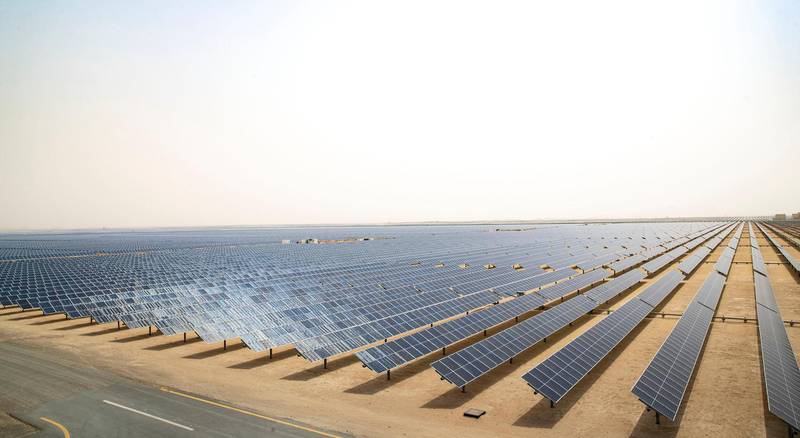Dubai to raise share of renewables to 14% of energy mix by end of year

Dubai will raise the share of renewables in its energy mix to 14 per cent by the end of 2022, as part of the emirate's efforts to reach its sustainability goals.
Renewables currently account for 11.5 per cent of Dubai's energy mix, Saeed Al Tayer, managing director and chief executive of Dubai Electricity and Water Authority (Dewa), told state-run news agency Wam.Read More : Moody’s affirms Baa1 rating to Noor Abu Dhabi solar PV project bonds “We will continue to implement pioneering projects to diversify Dubai’s clean and renewable energy sources to include all available technologies in Dubai ... for a brighter and more sustainable future for generations to come,” Mr Al Tayer said.
Dubai aims to generate 25 per cent of its energy requirements from renewable sources by 2030 and 100 per cent by 2050 as part of its clean energy target.
Dewa is building the world’s largest solar energy park in the Dubai desert in an effort to reduce reliance on natural gas and diversify its power sources.
Dewa said that the total energy production capacity had reached 14.11 gigawatts, with 1.62 gigawatts from renewable energy, after it added 700 megawatts in capacity, Wam reported.
This includes 600MW from the Hassyan Power Complex, which runs on natural gas, and 100MW from photovoltaic solar panels at the fifth phase of the Mohammed bin Rashid Al Maktoum Solar Park.
The current production capacity of the Hassyan Power Complex has reached 1.8 gigawatts, using the independent power producer model. A further 600MW will be added in 2023, raising the capacity of the project to 2.4 gigawatts.
The Hassyan Power Complex adds to the Jebel Ali power plant and water desalination complex. The Jebel Ali facility has a total production capacity of 9.54 gigawatts of electricity.
The UAE has embraced the energy transition by taking a leading position in new fuels such as green and blue hydrogen as it looks to tap the growing market for low-carbon fuel.
Renewables currently account for 11.5 per cent of Dubai's energy mix, Saeed Al Tayer, managing director and chief executive of Dubai Electricity and Water Authority (Dewa), told state-run news agency Wam.
Dubai aims to generate 25 per cent of its energy requirements from renewable sources by 2030 and 100 per cent by 2050 as part of its clean energy target.
Dewa is building the world’s largest solar energy park in the Dubai desert in an effort to reduce reliance on natural gas and diversify its power sources.
Dewa said that the total energy production capacity had reached 14.11 gigawatts, with 1.62 gigawatts from renewable energy, after it added 700 megawatts in capacity, Wam reported.
This includes 600MW from the Hassyan Power Complex, which runs on natural gas, and 100MW from photovoltaic solar panels at the fifth phase of the Mohammed bin Rashid Al Maktoum Solar Park.
The current production capacity of the Hassyan Power Complex has reached 1.8 gigawatts, using the independent power producer model. A further 600MW will be added in 2023, raising the capacity of the project to 2.4 gigawatts.
The Hassyan Power Complex adds to the Jebel Ali power plant and water desalination complex. The Jebel Ali facility has a total production capacity of 9.54 gigawatts of electricity.
The UAE has embraced the energy transition by taking a leading position in new fuels such as green and blue hydrogen as it looks to tap the growing market for low-carbon fuel.
Source: www.thenationalnews.com
